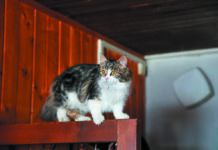You expect your cat to slow down as he grows older — more sleep, less frenetic darting around that seems to start out of nowhere. But some cats grow increasingly temperamental. They’ll swat you away with little warning — or no warning — when you try to stroke them or give them attention in other ways that made them feel good in the past. And they become less interested in connecting in general. What could be going on?
A change in the household can stress a cat, of course — a new baby, the introduction of a second pet, or more people coming and going. But if everything about a cat’s life has remained stable, there are two other things to consider if a cat’s bad moods become more frequent as he makes his way through the geriatric years.
- Pain. Just like a person in pain, a cat in pain may not want to be touched as often. And he may not feel like interacting. Think of yourself in the throes of pain. If you have a headache or a stomach ache, the last thing you may want is to be touched or engaging in conversation or some other form of communication. Ditto if your arthritis is acting up, and it’s hard even to bend, turn quickly, or open a jar. Not being able to go through your day comfortably isn’t going to put you in the mood for pleasant interactions.
- Dementia. Cognitive decline in a cat, just like in a person, can lead to anxiety that results in aggression. It makes sense. If you feel disoriented by people and situations that once made sense to you, you might be more prone to lash out in frustration or fear because you don’t understand what’s going on. Indeed, extreme irritability and avoidance of social interaction are two signs that could suggest dementia.
How to respond
If your cat doesn’t want the same level of attention and interaction you have always had with him, it’s incumbent on you to respect his desire for space. But you also should take him to the veterinarian. A clinical exam and perhaps some testing in the form of blood or urine screening or imaging can help you find out whether your pet has developed a condition that is causing him pain and needs to be treated. Remember, cats like to keep their illnesses a secret. An increasingly unpleasant demeanor might be the key clue that something needs tending.
A vet can also help you determine whether your cat is in cognitive decline that could be affecting his formerly pleasant state of mind. The doctor will talk to you about changes in sleep patterns, appetite, use of the litter box/house soiling, and other shifts in routine that, when added together, can lead to a diagnosis of dementia.
No matter what the situation — pain or dementia — work conscientiously to keep things in your house calm, and make sure your pet has cozy hiding places where no one will bother him.





Your article was so appropriate for me as I have been cursed with depression and anxiety since I was a teen. There really is no cure. Just coping measures with meds and therapy. Sone years better than other as one goes through life. I wish every catnn go i where coukd read it gesecsrticles. I have had cats all my lives fe. P mresently I have three . No geriatrics . Mistlyvlstexteebs to h my store. All have different Temperaments for sure.
I look forward to reading all your articles.
I wish every cat owner could be made more aware of cat psychology.
Thank you so very much.